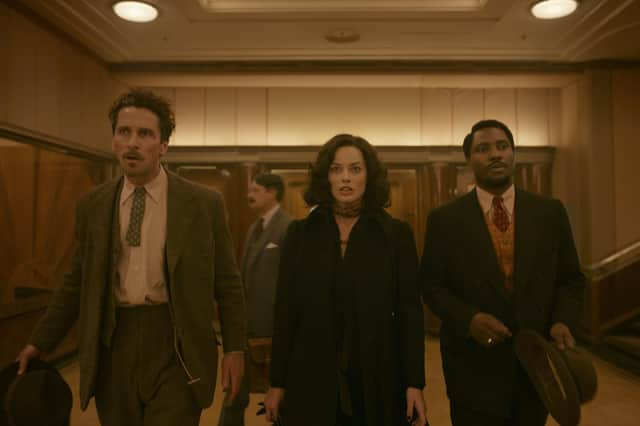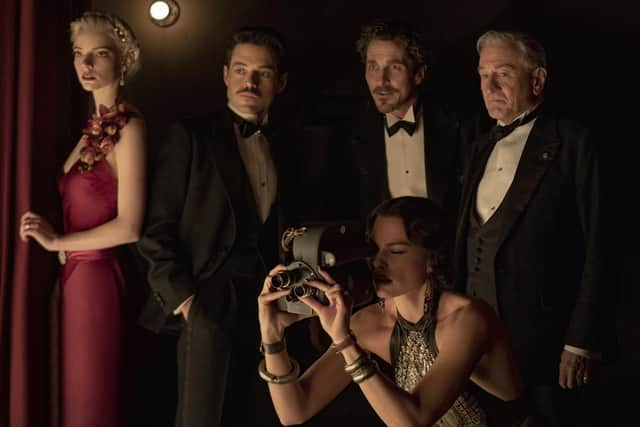Film reviews: Amsterdam | The Woman King


Amsterdam (15) ****
The Woman King (15) ****
Amsterdam finds American Hustle writer/director David O Russell once again on slyly subversive form with a rollicking all-star period caper movie that speaks directly to the dangerous absurdity of the Trump era. Jumping around between the First World War and the early 1930s, it stars Christian Bale and John David Washington as Burt Berendsen and Harold Woodman, comrades in arms during the war in Europe and latterly battle-scarred best friends trying with varying degrees of success to devote their professional lives (Burt’s a doctor, Harold’s a lawyer) to helping their fellow soldiers negotiate life in a country that’s forgotten about them.
Kicking off in New York in 1933, the film quickly embroils this pair in a bizarre conspiracy when their former commanding officer (Ed Begley Jr) turns up dead en route to speak at an annual veteran’s reunion they’ve organised. The deceased’s daughter (a juicy little cameo for Taylor Swift) suspects foul play and Burt’s loyalty to her father, along with his own anti-authoritarian leanings and fringe presence on the medical scene, convince him to perform a somewhat illicit autopsy to uncover the truth – a course of action that soon has him and Harold on the run from the police.
Advertisement
Hide AdAt which point the film jumps back to the Great War to sketch out the origins of a friendship forged in chaos. The lowly Burt, we discover, was dispatched to serve as a medic at the urging of his well-to-do in-laws and he meets Harold when he’s assigned to a Black regiment forced to wear French uniforms because the US army refuses to integrate. Saving each others’ lives, they end up in a field hospital in Belgium, with Burt minus an an eye, Harold minus part of his face, and both now in possession of bodies full of shrapnel.
Like Robert Altman’s anti-war classic M*A*S*H, Russell juxtaposes the film’s free-wheeling comedic tone here with harsh close-ups of medical procedures, then proceeds to up the black comedy ante by introducing Margot Robbie as a nurse hiding out from her New York society family in Europe where she also makes avant-garde art from the bullets and shell-casings she extracts from her patients. The trio become inseparable as Valerie (Robbie) falls for Harold and encourages both him and Burt to hightail it to Amsterdam where they’re able to exist for a little while in a dreamy bohemian bubble a world away the supposed melting pot of New York (once of known as New Amsterdam).
If this all sounds like a shaggy dog story, that’s part of the film’s appeal and also its design – the central trio deliver big, broad, movie-star performances that carry us along so that Russell can sneak in more serious points about the shameful neglect of those on the margins. But as with his Gulf War comedy/drama Three Kings, he’s also got bigger fish to fry. As the twists and turns multiply, we’re introduced to a conspiracy involving ornithology, spies, eugenics labs and one based-on-fact plot from the time that’s too much of a spoiler to reveal in detail here but does afford Robert De Niro a meaty supporting role as a famous general being courted by various American business interests who like what they’re seeing in Italy and Germany.


As Amsterdam races towards its conclusion, the caper aspect does become increasingly manic and preposterous. Yet in a world where a violent assault on American democracy can be launched in the wake of a legitimate election, the outlandishness and chaos of its treatise on fascism’s rise only sharpens the contemporary parallels. “Why take something beautiful and ruin it with violence,” a character asks of Valerie’s shrapnel-distorted art at one point. It’s a question Russell lets hang over the film, drawing attention to the way corrupt forces repeatedly sacrifice and destroy bodies, limbs, minds and ideals in the pursuit of wealth and power.
There’s a politically rich story at the heart of The Woman King too, a rousing action epic set against the backdrop of the 19th century slave trade. Viola Davis stars as Nanisca, the leader of an army of fearsome female warriors in the historical West African kingdom of Dahomey. With a newly ascendant king (played by John Boyega), Nanisca wants to use her experience and influence to extract Dahomey from the slave trade by convincing the king to export palm oil instead of people, something that will also require breaking Dahomey’s ties with the Oyo Empire, which bolsters its riches by working with European traders. But Nanisca also has a more personal reason for wanting to take down the Oyo and the film smartly foregrounds her personal revenge quest, intertwining it with the arrival of of brash young recruit, Nawi (played by Thuso Mbedu), who has a mysterious past all her own.
Like Braveheart and Gladiator before it, the film uses history as a jumping off point for myth-making and in the process delivers an all-out action spectacle, just from a perspective movies have tended to ignore. Coming off the back of the Netflix-funded comic book movie The Old Guard, director Gina Prince-Blythewood draws from superhero mythology too, but in Davis she’s blessed with a heavyweight actor with the requisite gravitas to make it work. No Time To Die’s Lashana Lynch further enlivens proceedings as Nawi’s charismatic mentor Izogie.
Both films on general release from 7 October